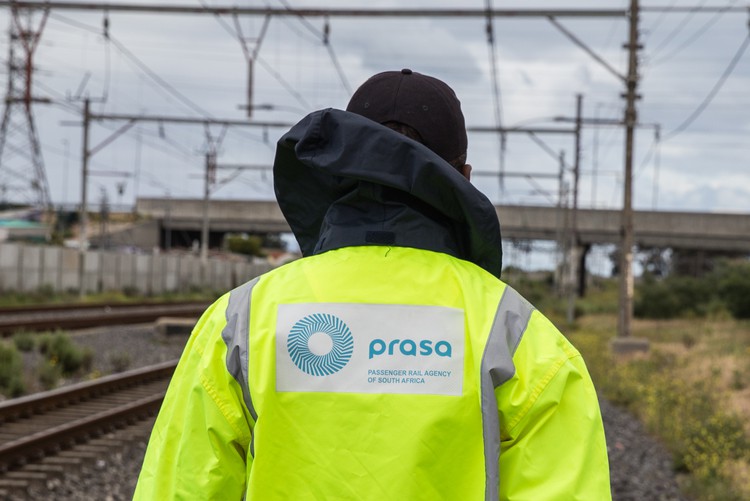Train safety: auditors recommend criminal investigations at PRASA
Forensic probe reveals millions of rands in irregular security contracts

A security company to which the Passenger Rail Agency of South Africa (PRASA) paid at least R118 million was not registered with the Private Security Industry Regulatory Authority (PSIRA). Nor does it show up on a company search. And it does not answer its listed phone number.
No company is allowed to provide security services in South Africa without PSIRA registration.
In fact the company, Changing Tides 208 (Pty) Ltd to which PRASA paid at least R118m between 2010 and 2016, does not appear to exist.
It does not appear on a company registration search and calls to the telephone number listed in the Yellow Pages elicit a Telkom recorded message stating the number is not in use.
A call to PSIRA also revealed no record of the company.
The contract with Changing Tides 208 – if one ever existed - was one of 16 security contracts which figure in the list of 193 contracts with PRASA that were investigated by audit firms commissioned by the National Treasury. The Treasury commissioned the audit firms to examine all PRASA contracts worth more than R10 million since 2012, following former Public Protector Thuli Madonsela’s 2015 Derailed report on mismanagement at the rail agency. GroundUp published these reports last week after they were leaked to the UniteBehind Coalition.
All but one of the 16 contracts were for the provision of security at stations and facilities in Gauteng, and were inherited from Transnet’s Metrorail and Mainline Passenger Services.
In 11 of the 16 contracts investigated, the auditors recommend criminal investigation for contravention of the Public Finance Management Act.
PRASA was supposed to embark on a national security tender process in 2012 but did not do so as its budget did not allow it to conform to security minimum wage determinations.
“Security budget at the time could not accommodate the market related prices for private security as regulated by PSIRA,” states a report by Deloittes. Instead, then Group Chief Executive Officer Lucky Montana seems to have extended the security contracts over and over again for four years.
A national tender for security services was only advertised in August 2016, more than four years later.
None of the auditors looking into the provision of security were provided with the original contracts, nor with any of the contract extensions.
There were no signed contracts, original bid specifications, nor work specifications to be found. The auditors found that more than R73 million had been paid in irregular expenditure to these contractors but the actual amounts may be much more, since all the auditors note the lack of documentation supplied by PRASA and security suppliers. One auditing firm, JGL Forensic Services, says that annual expenditure on these suspect contracts might be in excess of R300 million a year.
Strategic Investigations and Forensics examined ten of the 16 security contracts Treasury commissioned for investigation. For each one of them it recommended the accounting authority be criminally charged for contravening the Public Finance Management Act.
JGL notes that the continual extension of security contracts to the same security providers contravenes the Constitution. In dealing with procurement, the Constitution states that the contracting of goods by an organ of state must by fair, equitable, transparent, competitive and cost-effective. This is echoed in the Public Finance Management Act, Treasury regulations and PRASA’s own Supply Chain Management policy.
Security problems on Metrorail
Security on trains and at stations has been a long-standing issue at PRASA, particularly for Metrorail commuters who rely on the rail agency to get to and from work.
In 2015 the Constitutional Court ordered PRASA to pay for damages suffered by Irvine Mashongwa who had to have his left leg amputated after being assaulted, robbed and thrown from a moving train in Pretoria on New Year’s Day 2011.
In November the Western Cape High Court found PRASA responsible for injuries suffered in 2011 by Masibulele Rautini who was pushed out of a moving train by robbers in Stellenbosch.
Sabotage also plagued PRASA during security guard strikes over uncertainty whether contracts would be renewed in 2012. In 2013, security companies had to go to court to force PRASA to pay them R11 million owed over a five-month period.
The persons responsible for security during the period reviewed were Kabelo Mantsane, from 2008 to 2013, and Mkhuseli Matakata, who replaced him as Head Group Corporate Security. We have been unable to trace Matakata. Mantsane did not respond to our questions. Neither did PRASA’s Acting CEO Lindikhaye Zide.
PRASA CEO at the time, Lucky Montana, has previously told GroundUp not to send him questions. “I asked you to stop sending me your stupid questions,” he told us via a direct message on Twitter.
Produced for GroundUp by West Cape News.
Support independent journalism
Donate using Payfast

Don't miss out on the latest news
We respect your privacy, and promise we won't spam you.
Next: Cigarettes and dagga on Metrorail trains
Previous: Drought: Has Cape Town planned properly for Day Zero?
© 2017 GroundUp. 
This article is licensed under a Creative Commons Attribution-NoDerivatives 4.0 International License.
You may republish this article, so long as you credit the authors and GroundUp, and do not change the text. Please include a link back to the original article.
